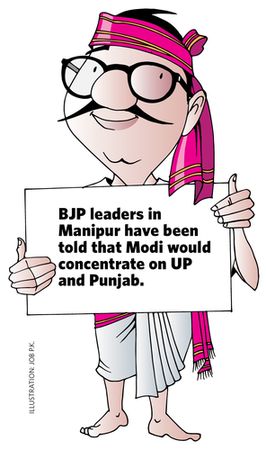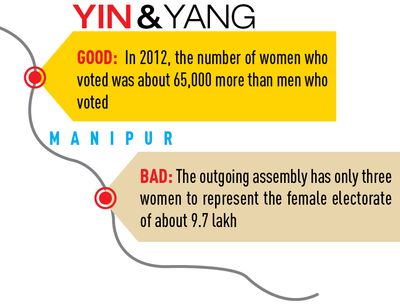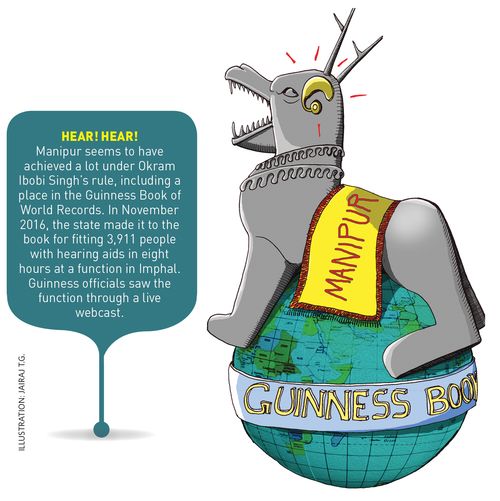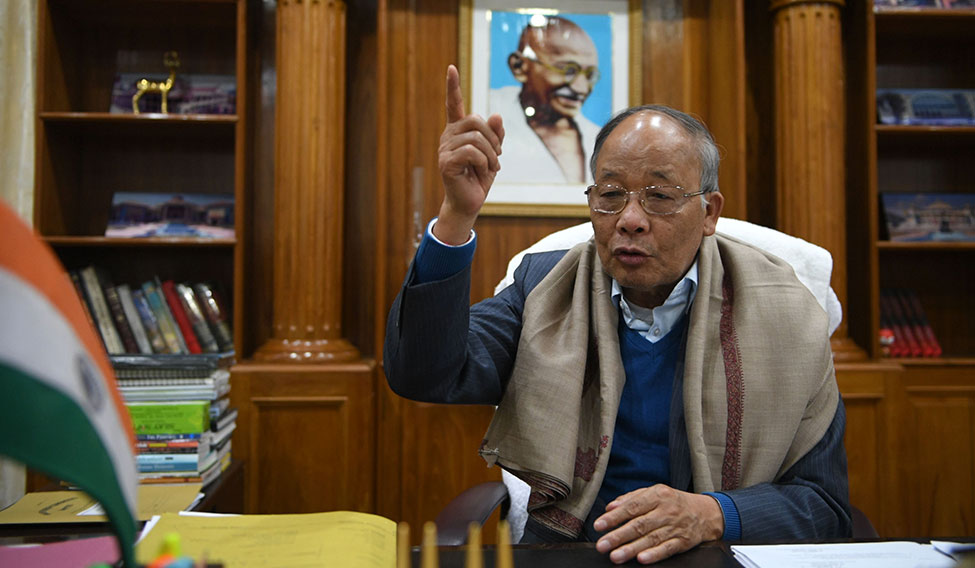The BJP office in Imphal was bustling with activity, with people flocking to the courtyard and gathering at a meeting area named after the founder of the party, Syama Prasad Mookerjee. Though most of the senior leaders were in Delhi on January 23, the local leaders were attentive to the visitors and were keeping an eye on television, watching the last-minute declaration of candidates.

On January 21, following a rumour that a first list of 17 candidates had been announced, some ticket seekers took to the streets, demanding the withdrawal of the list. BJP treasurer Robin Blackie and state general secretary Nimbas Singh had a tough time placating them. Apparently, several factions in the party had lobbied for different candidates and there were signs of infighting. “Yes, it’s quite natural,” said Blackie. “It shows the party has grown manifold in Manipur. Those who would have chance to win would be given ticket. Others would have to work hard to help them win. Everyone wants to be our candidate. They know that the BJP is coming to power in Manipur thanks to the Modi wave.”
Prime Minister Narendra Modi, however, will campaign only once in Manipur, in Imphal, which is dominated by Hindu Meiteis, in mid-February. The state leaders have been told that Modi would concentrate on UP and Punjab.
Modi’s absence, said Nimbas Singh, would be filled by leaders such as Smriti Irani, Prakash Javadekar and Shahnawaz Hussain. Mary Kom, the boxer who is a Rajya Sabha member, would also campaign for the BJP. “She is an Olympian and our MP. She would be our star campaigner,” said Nimbas.
Party president Amit Shah will hold three rallies, but none of them in Hindu-dominated areas. He would go to Naga-dominated areas, which have about 15 seats. As the BJP has been criticised for having close ties with the Nagas and for possibly supporting a division of Manipur to create a Naga-only state, the party seems to have realised that the Hindu Meiteis, who dominate the state, are slowly moving away from it.
Said Blackie: “We have decided to go it alone. We will not tie up with any party, not even the Naga People’s Front [the BJP’s ruling partner in Nagaland]. There could be post-poll alliance with them if needed.”
About 500m away, on the opposite side of the road, the state Congress office wears a deserted look—the leaders had left for their constituencies and there were few visitors.

Did this signal a rise of the BJP in Manipur? “Such a rumour has been going on for some time,” said state Congress president T.N. Haokip. “Months ago, they said they would wrest municipalities in Imphal. But they lost all the elections by a big margin ever since Modi has come to power. We could eat up their party if we wish.”
Chief Minister Okram Ibobi Singh told THE WEEK: “I would be able to know their expansion only after the election result. But, my experience and reports suggest that we would get about 45 of 60 seats in Manipur.”
Though he did not criticise the Central government for not releasing funds, he said the amount released was not enough. “When I get money from the Central government, there would be a long delay. So, in my state, I have repaired or constructed national highways with money from the state exchequer.”
To increase revenue, so that he could finance his development projects and reforms, Ibobi Singh has decided to revoke the decades-old prohibition on liquor. “The tag of dry state is on paper,” he told THE WEEK. “In reality, liquor is sold or secured by a large number of people from different sources. I want to withdraw prohibition and earn revenue from it. It would speed up development in my state.”
Manipur has changed in many ways during his tenure. In September 2014, he persuaded the UPA government at the Centre to withdraw the Armed Forces Special Powers Act (AFSPA) from Imphal, and the city has since witnessed a business boom: big buildings have come up, foreign brands have opened outlets and a number of new hotels have been planned to promote tourism.
Manipur has become the number one state in the northeast to utilise Central funds for laying rural roads. Even before the Modi government announced the Jan-Dhan Yojana, the state government brought banks to 27 unbanked blocks of Manipur, many of them in the Naga-dominated hill areas. “We have spent about Rs 20 crore to create buildings, staff and security establishments for these banks,” said Ibobi Singh.
Money was spent on social welfare, too. New hospitals and medical colleges came up, and the power situation improved with the setting up of more substations. And, with a complete withdrawal of AFSPA, Ibobi Singh said investment would return to Manipur.

Haokip, however, was sceptical. “I don’t know how long the Centre would allow it,” he said. “Even if we withdraw it from the entire state, the BJP government might force it back. At least in this matter, their action would prevail over ours.”
Said Ibobi Singh: “I want to withdraw AFSPA from the entire state, but I need help from the Central government as well. With this, a clear signal could be sent to underground groups that we are waiting for a clear move from them. They should shun violence and come to the talking table.”
Interestingly, Ibobi Singh said his decision to lift AFSPA in Imphal was influenced by the long fast of Irom Sharmila who, incidentally, is contesting against him in Thoubal.
Some years ago, said Ibobi Singh, Sharmila’s family had met him and requested him to withdraw AFSPA. “They broke down in tears and asked me to withdraw AFSPA to save her life.” he said. “I was moved and I went to the prison ward of the hospital where she was lodged. I requested her to end the fast, but she refused.”
When asked about Ibobi Singh’s visit, Sharmila told THE WEEK: “I won’t comment on what the chief minister says.”
Unlike the offices of the established parties, Sharmila’s base is on the outskirts of Imphal. She cycles to the place every day. At the office of her party, the People’s Resurgence and Justice Alliance, there were five candidates, some volunteers and two full-time members recruited from election strategist Prashant Kishor’s strategy group. Kishor, however, is not directly involved with the campaigning. His juniors, from Gujarat and Delhi, have created a core group of strategists, and the party gets donations online. It has set a donation target of 150 lakh to bear the election costs.
Sharmila has been perturbed as the media has not portrayed her as a serious opponent to other leaders. “She is going through a psychological change because of changing circumstances,” said a PRAJA member. “Don’t forget that for 16 years she had had a horrible life. Coming out of it, she did not have any idea how the world had changed, how we are now driven by social networking sites like Facebook and Twitter. I think the media should give her a break and let her get accustomed to the present situation.”
After she announced her decision to contest against the chief minister, she hitched a ride on a motorcycle to reach Thoubal every day. She doesn’t hold conventional rallies, but prefers a more personal approach. “She talks to villagers at their houses and makes direct contact with them,” said Erendro Leichombam, a Harvard graduate and PRAJA candidate in Imphal. “She appealed to her voters and told them why she jumped into the election.”
James Mayengbam, her party coordinator, said support would eventually come, but not overnight. “Remember that the people’s mood will change and it is bound to happen one day,” he said. “We are not here for one election.”
Said Ibobi Singh: “She was lonely and that is why she quit the fast,” he said. “Let us see what her role would be as a politician.”






